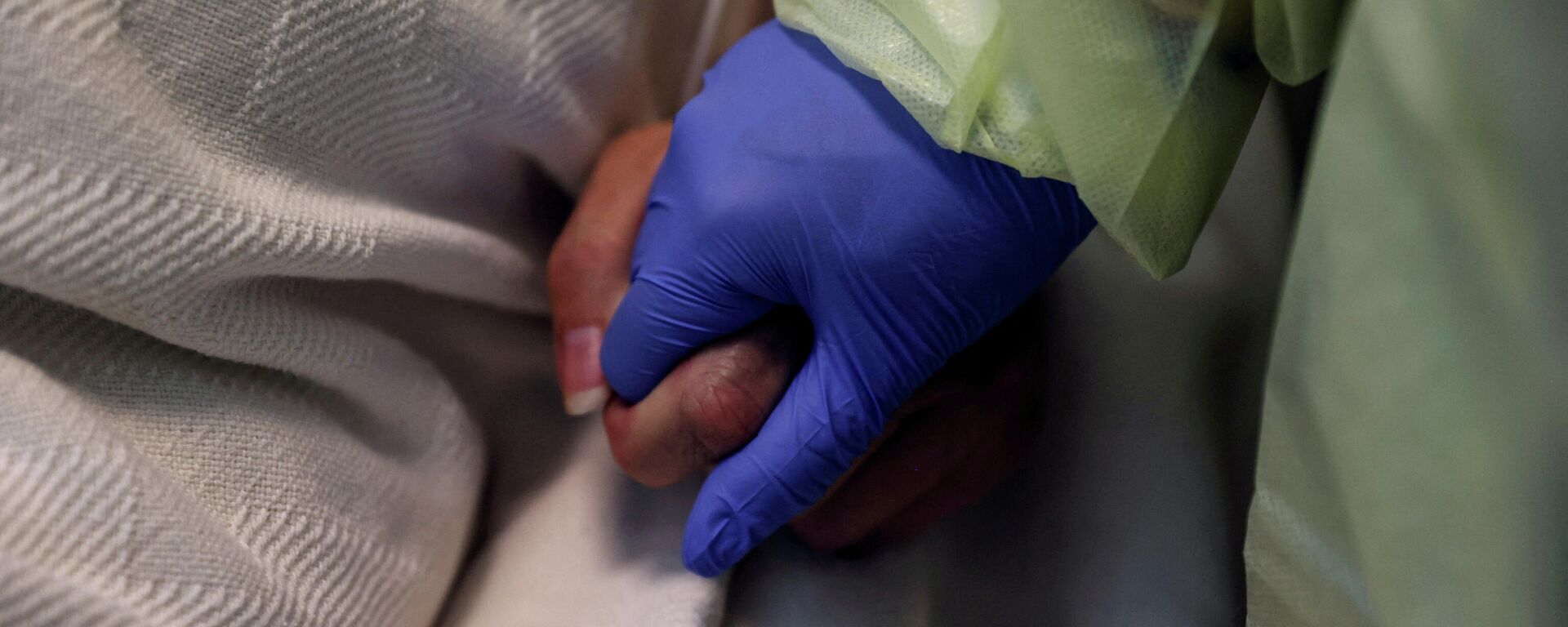https://sputnikglobe.com/20220209/doctors-ignored-a-24-year-old-womans-cries-for-help-for-years-misdiagnosed-her-cancer-as-stress-1092895144.html
Doctors Ignored a 24 Year-Old Woman’s Cries for Help for Years, Misdiagnosed Her Cancer as Stress
Doctors Ignored a 24 Year-Old Woman’s Cries for Help for Years, Misdiagnosed Her Cancer as Stress
Sputnik International
In the health world, female patients are often subject to gaslighting by medical professionals. Hannah Catton suffered when almost a dozen physicians excused... 09.02.2022, Sputnik International
2022-02-09T23:41+0000
2022-02-09T23:41+0000
2022-02-09T23:39+0000
cancer
ovarian cancer
https://cdn1.img.sputnikglobe.com/img/102405/07/1024050719_0:2418:7200:6468_1920x0_80_0_0_8fa5f06daceb1145a5133faf21fe6480.jpg
Catton’s symptoms began in late 2018 with frequent urinary tract infections, symptoms that were quickly dismissed by doctors. When she later returned to tell them about her irregular periods, and complaints about bloating, constipation, diarrhea and extreme pain, she was once more ignored.After being disregarded by almost a dozen doctors over the course of three years, Catton eventually succumbed to the extreme pain she’d been experiencing and collapsed in October 2021, forcing her to go to the emergency room. She would later find out her symptoms were the result of ovarian cancer.At the hospital, surgeons pulled a large cancerous mass from one of her ovaries. The mass was almost the size of a volleyball, weighing 4.5 pounds.About three days after the tumor was removed and tested, doctors found that the cancer hadn’t spread in Catton; however, because the tumor had gone unchecked for so long, it ruptured. She eventually underwent chemotherapy treatment in case residual cancer remained.Catton had moved to Australia from England, making the call back home to her parents difficult. Due to the COVID-19 pandemic, Australia’s travel restrictions meant the 24 year-old had to undergo surgery and medical treatment alone, without her parents by her side.After researching ovarian cancer Catton discovered that it is difficult to detect because of its vague symptoms, and unlike other gynecologic cancers, there are no reliable screening tests.After finally getting a diagnosis, as well as some answers, she went back to the doctors who dismissed her to tell them they got it wrong - this time, they didn’t ignore her. The physicians told her they would go through ovarian cancer awareness training to help them spot symptoms in the future. Now, Catton wants to use her experience to advocate for other women, so no one has to suffer the way she did.Serious health issues faced by women are usually reduced to insignificant diagnosis, such as stress, anxiety, or “normal” period pain, when what women are facing could be as serious as cancer, heart disease, or any other life-threatening illnesses.A study published in Academic Emergency Medicine found that women who went to the emergency room with severe stomach pain had to wait 33% longer than men with the same symptoms.When asked about this disparity in an article published by Katz Institute for Women’s Health, Dr. Stephanie McNally said, “It’s no accident that the word ‘hysteria’ originates from the Greek word for ‘uterus’. There’s still this pervasive belief in the medical community that anytime a woman complains about her health, it’s either related to her hormones or all in her head.”“Unfortunately, these sorts of beliefs still carry on today,” she added.
https://sputnikglobe.com/20220202/biden-administration-aims-to-reduce-cancer-death-rate-by-50-over-next-25-years-1092694899.html
Sputnik International
feedback@sputniknews.com
+74956456601
MIA „Rossiya Segodnya“
2022
News
en_EN
Sputnik International
feedback@sputniknews.com
+74956456601
MIA „Rossiya Segodnya“
Sputnik International
feedback@sputniknews.com
+74956456601
MIA „Rossiya Segodnya“
cancer, ovarian cancer
Doctors Ignored a 24 Year-Old Woman’s Cries for Help for Years, Misdiagnosed Her Cancer as Stress
In the health world, female patients are often subject to gaslighting by medical professionals. Hannah Catton suffered when almost a dozen physicians excused her cancerous symptoms as stress - one physician went so far as to suggest that the 24 year-old should “try losing weight.”
Catton’s symptoms began in late 2018 with frequent urinary tract infections, symptoms that were quickly dismissed by doctors. When she later returned to tell them about her irregular periods, and complaints about bloating, constipation, diarrhea and extreme pain, she was once more ignored.
After being disregarded by almost a dozen
doctors over the course of three years, Catton eventually succumbed to the extreme pain she’d been experiencing and collapsed in October 2021, forcing her to go to the emergency room. She would later find out her symptoms were the result of ovarian cancer.
At the hospital, surgeons pulled a large cancerous mass from one of her ovaries. The mass was almost the size of a volleyball, weighing 4.5 pounds.
About three days after the tumor was removed and tested, doctors found that the cancer hadn’t spread in Catton; however, because the tumor had gone unchecked for so long, it ruptured. She eventually underwent chemotherapy treatment in case residual cancer remained.
Catton had moved to Australia from England, making the call back home to her parents difficult. Due to the COVID-19 pandemic, Australia’s travel restrictions meant the 24 year-old had to undergo surgery and medical treatment alone, without her parents by her side.
“My parents - they just feel helpless. Like, what can you do over the phone?” she said.
After researching ovarian cancer Catton discovered that it is difficult to detect because of its vague symptoms, and unlike other gynecologic cancers, there are no reliable screening tests.
After finally getting a diagnosis, as well as some answers, she went back to the doctors who dismissed her to tell them they got it wrong - this time, they didn’t ignore her. The physicians told her they would go through ovarian cancer awareness training to help them spot symptoms in the future. Now, Catton wants to use her experience to advocate for other women, so no one has to suffer the way she did.
“As a patient, we should feel comfortable and confident enough to advocate for ourselves,” she said, adding, “If I’d have seen a story like this a year ago, two years ago, maybe it would have made me be a bit more forceful in how I was approaching it with doctors and saying, ‘No, listen to me.’”
Serious health issues faced by women are usually reduced to insignificant diagnosis, such as stress, anxiety, or “normal” period pain, when what women are facing could be as serious as cancer, heart disease, or any other life-threatening illnesses.

2 February 2022, 17:37 GMT
A study published in Academic Emergency
Medicine found that women who went to the emergency room with severe stomach pain had to wait 33% longer than men with the same symptoms.
When asked about this disparity in an article published by Katz Institute for Women’s Health, Dr. Stephanie McNally
said, “It’s no accident that the word ‘hysteria’ originates from the Greek word for ‘uterus’. There’s still this pervasive belief in the medical community that anytime a woman complains about her health, it’s either related to her hormones or all in her head.”
“Unfortunately, these sorts of beliefs still carry on today,” she added.


